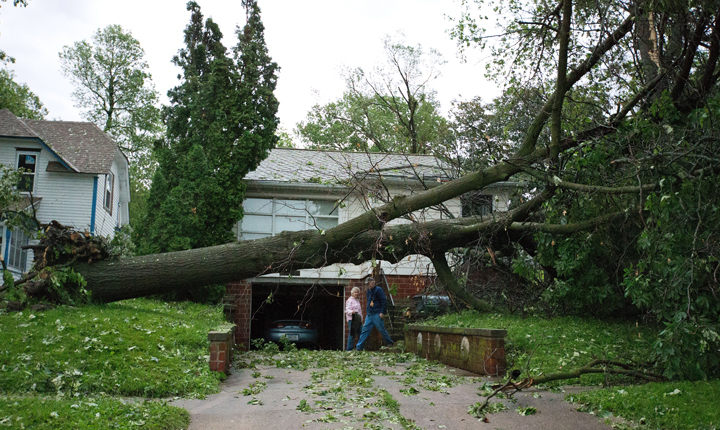DES MOINES, Iowa – Baseball-sized hail pummeled homes and cars in Nebraska and Iowa on Tuesday as powerful thunderstorms moved through a swath of Midwest states, also causing severe flooding and prompting reports of tornadoes.

The National Weather Service said reports of extensive hail damage and flooding trickled in as storms pushed into Nebraska and moved into neighbouring Iowa, where winds of up to 85 mph were recorded. Up to 4 inches of rain was expected in parts those states, which were the hardest hit. The storm also tracked across parts of Kansas, Missouri, South Dakota and Illinois.
READ MORE: WATCH–Incredible video shows tornado stopped dead in its track
“This is one of these days we can’t let our guard down,” said Bill Bunting, forecast operations chief at the Storm Prediction Center in Norman, Oklahoma.
Bunting said several trained spotters reported tornadoes in central and southwest Iowa, and at least one report came in from southwest Kansas. Reports will not be confirmed until damage can be assessed Wednesday morning.
Becky Kern, a meteorologist with the National Weather Service in Valley, Nebraska, said the system has involved a “training” of thunderstorms, which involves a series of thunderstorms following one after another. The system will move to the southeast early Wednesday, toward parts of Missouri and Illinois, she said.
“It looks like the threat has pushed further south into northern Missouri, the strongest of the storms,” she said.
Heavy rain and flooding were reported in the Omaha area of Nebraska, where dozens of residents were evacuated from low-lying homes on the northeast side of the city. The Eppley Airfield airport closed for several hours.
“It’s just completely flooded these areas, and these homes are now filling up with water in their basement areas, so we’re pulling people out,” said Omaha police spokesman James Shade, noting a 95-year-old woman in a wheelchair was rescued.
Police also used boats to assist dozens of drivers stranded in floodwaters around the city. Shade said many cars remain stuck on those flooded streets.
- Posters promoting ‘Steal From Loblaws Day’ are circulating. How did we get here?
- Video shows Ontario police sharing Trudeau’s location with protester, investigation launched
- Canadian food banks are on the brink: ‘This is not a sustainable situation’
- Solar eclipse eye damage: More than 160 cases reported in Ontario, Quebec
Iowa Gov. Terry Branstad issued Tuesday night a proclamation of disaster emergency for Pottawattamie County in the western part of the state, which will allow officials to use state resources to respond to the effects of the storms.
In the northeast Nebraska cities of Norfolk and Blair, residents reported shattered windows in homes and vehicles after baseball-sized hail passed through. The weather service received reports of two motels with roofs torn in western Iowa’s Missouri Valley.
On Interstate 29 north of Council Bluffs in western Iowa, more than 25 vehicles had their windows shattered by hail, said Terry Landsvork, an observation program leader for the National Weather Service in Valley, Nebraska.
“They were driving along Interstate 29, had no place to go, and whether they were driving or pulled over, they just didn’t escape the hail,” he said.
The storms impacted primary elections in Iowa and South Dakota. Officials in Pottawattamie and Montgomery counties in Iowa, where polls closed at 9 p.m. CDT, reported closing some precincts temporarily due to poor weather.
“It’s nasty here. You can’t imagine,” said Pottawattamie County Auditor Mary Jo Drake. “It’s as black as the ace of spades.”
In South Dakota, where polls closed at 8 p.m. CDT, a morning thunderstorm forced Senate candidate Mike Rounds, who was flying to Rapid City, to land in Pierre.
The severe weather threat arrives amid an unusually quiet late spring, with far fewer documented tornados in May than in many recent years. Bunting said the main concern Tuesday night was widespread straight-line winds.
“As we like to say, it doesn’t have to rotate to be dangerous,” he said.
–Associated Press reporters Alan C. Zagier in St. Louis and Thomas Beaumont in Des Moines contributed to this report.

Comments